
Lamivudine + Zidovudine + Nevirapine
150 mg+300 mg+200 mg
Beximco Pharmaceuticals Ltd.
Product Details
Description
A fixed dose combination of Lamivudine, Zidovudine and Nevirapine is recommended for HIV-1 infected patients who are able to tolerate maintenance therapy with Nevirapine 200 mg twice daily. All three drugs are to be administered twice daily and each tablet contains half of the daily dose for each component. Twice daily formulation in single tablet for three drugs is convenient for patients to take, ensuring higher rate of compliance.
Zidovudine: acyclovir and valacyclovir may increase CNS depression. Increased risk of haematologic toxicity with ganciclovir, valganciclovir, dapsone, doxorubicin, vincristine and vinblastine. Doxorubicin may reduce phophorylation; fluconazole may increase levels/effects; increased risk of hepatic decompensation or haematologic toxicities with interferon and ribavirin (also increases risk of pancreatitis and lactic acidosis). Methadone may increase effects/levels. Increased risk of myalgia, malaise and/or fever, maculopapular rash and effects/levels with probenecid. Stavudine may decrease antiviral activity; valproic acid may increase plasma levels (AUC increased by 80%). Lamivudine: Increased risk of hepatic decompensation or haematologic toxicities with interferon and ribavirin (also increases risk of mitochondrial toxicity, pancreatitis and lactic acidosis). Ganciclovir and valganciclovir may increase effects and toxicity; sulfamethoxazole/ trimethoprim may increase AUC and decrease clearance (increasing levels and effects).
Lamivudine: Pancreatitis, paresthesia, peripheral neuropathy, cough, dizziness, fatigue, gastrointestinal problems, headache, insomnia, anaemia, neutropenia, drug induced skin rash, hair loss. Zidovudine: Headache (which may be severe, has been reported in up to 63% of patients receiving Zidovudine and asthenia has been reported in 9-69%), malaise and fatigue, fever or chills, nausea (61% cases), diaphoresis, dyspnoea, rash and taste perversion have been reported. Skin rashes and myalgia has been reported in patients receiving Zidovudine. Myopathy and myositis with pathologic changes similar to that produced by HIV infection, have been associated with prolonged use of Zidovudine. The major adverse effect is bone marrow toxicity resulting in severe anaemia and/or neutropenia. Patients with low serum folate or vitamin B12 concentrations may be at increased risk for developing bone marrow toxicity during Zidovudine therapy. There also are limited data suggesting that bone marrow of patients with fulminant acquired immunodeficiency syndrome (AIDS) may be more sensitive to Zidovudine induced toxicity than that of patients with less advanced disease (eg, AIDS related complex). Anaemia and granulocytopenia usually resolve when Zidovudine is discontinued or when dosage is decreased. Lactic acidosis (in the absence of hypoxaemia) and severe hepatomegaly with steatosis, including some fatalities, have been reported in patients receiving Zidovudine. Nevirapine: More frequent incidences are skin rash, diarrhoea, gastrointestinal problems, headache, nausea and stomach pain. Incidence of less frequents are aphthous stomatitis, fever, hepatitis and Stevens Johnson syndrome.
Pregnancy Category C. Animal reproduction studies have shown an adverse effect on the fetus and there are no adequate and well-controlled studies in humans, but potential benefits may warrant use of the drug in pregnant women despite potential risks
For the following conditions, assess risk to patient and take action as needed, chronic hepatitis B, hepatomegaly with steatosis, lactic acidosis, liver function impairment, severe renal function impairment, peripheral neuropathy.
Drugs for HIV / Anti-retroviral drugs
Should be stored in cool and dry place
-
Support 24/7
Call us anytime -
100% Safety
Only secure payments